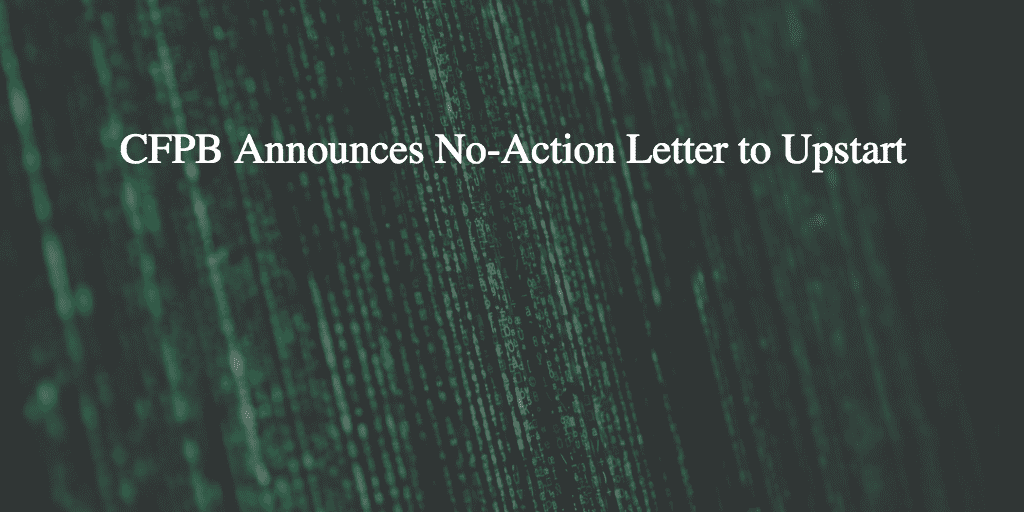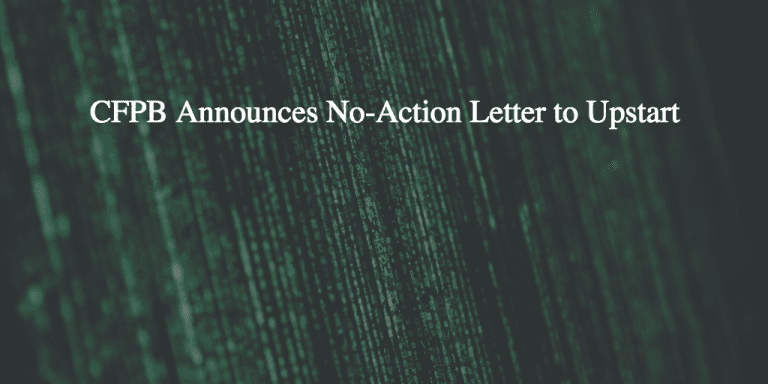
Today, the Consumer Finance Protection Bureau (CFPB) announced a no-action letter to Upstart, an online consumer lender. A no-action letter essentially allows a company that is regulated by a government entity, in this case the CFPB, to operate under certain circumstances as proposed by the company without enforcement or supervisory action. For the CFPB the goal is to explore consumer-friendly innovations for emerging products or services. The announcement today by the CFPB is significant as it is the first no-action letter of its kind. The CFPB previously sought public feedback on the benefits and risks of using unconventional data to extend credit earlier this year.
When we talk about underwriting with alternative data we often talk about companies that operate outside of the US. Since many countries lack the protections similar to what we have in the US, it opens up the possibilities of using alternative data for many different things, including making credit decisions. Some examples include social data and mobile phone data. Two great examples of this include Tala and Lenddo which have both been featured on the Lend Academy podcast.
Upstart was founded by ex-Googlers and many of the employees hail from Google. They have differentiated themselves, leaning on their learnings at Google to use alternative data, machine learning and artificial intelligence to make better credit decisions. Some of the data points they have used historically has been using information around a borrower’s education. According to the CFPB’s news release:
Alternative data could include things such as bill payments for mobile phones and rent, electronic transactions such as deposits and withdrawals, and other information that may be less closely tied to a person’s financial conduct. This inquiry also looked at the use of emerging technologies for underwriting, such as the expanded use of machine learning to potentially identify new insights and improve decisions in the credit process.
According to the news release, Upstart will report lending and compliance information to the CFPB to mitigate risk to consumers and aid in the Bureau’s understanding of the real-world impact of alternative data on lending decision-making. The CFPB is interested in learning how using alternative data can help extend credit to more borrowers at affordable rates. The no-action letter relates to enforcement of the Equal Credit Opportunity Act and Regulation B.
The request for a no-action letter (linked at the end of this blog post) is an interesting read. Below is a passage I found particularly interesting where Upstart shares just how much their underwriting has improved rates for borrowers:
To examine the effect of limiting Upstart’s underwriting model to variables derived solely from the credit report and applicant-reported income, Upstart built a model (“the limited model”), which does not rely on non-traditional variables. A September 2016 comparison between the limited model and Upstart’s production model found that the limited model recommended higher interest rates than the Upstart production model. Specifically, in evaluating the same pool of borrowers (a random sampling of individuals who actually received loans through Upstart between 2014-2016), the limited model set an average APR of 23.5% while Upstart’s production model recommended an average APR of 16.7%. That is a difference of 680 basis points. In comparing all Upstart applicants (as opposed to just individuals who received loans from Upstart), the limited model recommended an APR that was 560 basis points greater than the Upstart production model. The limited model explains much less of the variance in default rate across the Upstart borrower pool, resulting in a convergence toward the higher-risk mean. Thus, on average, the Upstart model provides better terms to borrowers than a model relying solely on traditional variables.
We reached out to Dave Girouard, CEO and Co-Founder of Upstart who provided this statement:
The no-action letter validates that alternative underwriting, including AI/ML, is critical to improving access to affordable credit, and that it can be done within the bounds of fair lending laws. It’s a big day for Upstart and for the industry overall.
Conclusion
As Dave pointed out this is big news not just for Upstart but for all of marketplace lending. Many companies, not just Upstart. are using machine learning today to make lending decisions. While the CFPB no-action letter “is specific to the facts and circumstances of the particular company and does not serve as an endorsement of the use of any particular variables or modeling techniques”, it does signify an openness in looking at new underwriting approaches that can expand access to credit.
There have been whispers in the industry over the years that Upstart may eventually fall foul of the CFPB. This no-action letter can put to rest those whispers for now. Upstart is a leader in alternative data and they are one of the larger online consumer lenders in the US. It’s going to be interesting to see what this news could mean for the entire industry longer term and it’s fascinating to see how much alternative data can help in underwriting borrowers.
You can view Upstart’s full no-action letter application here.


